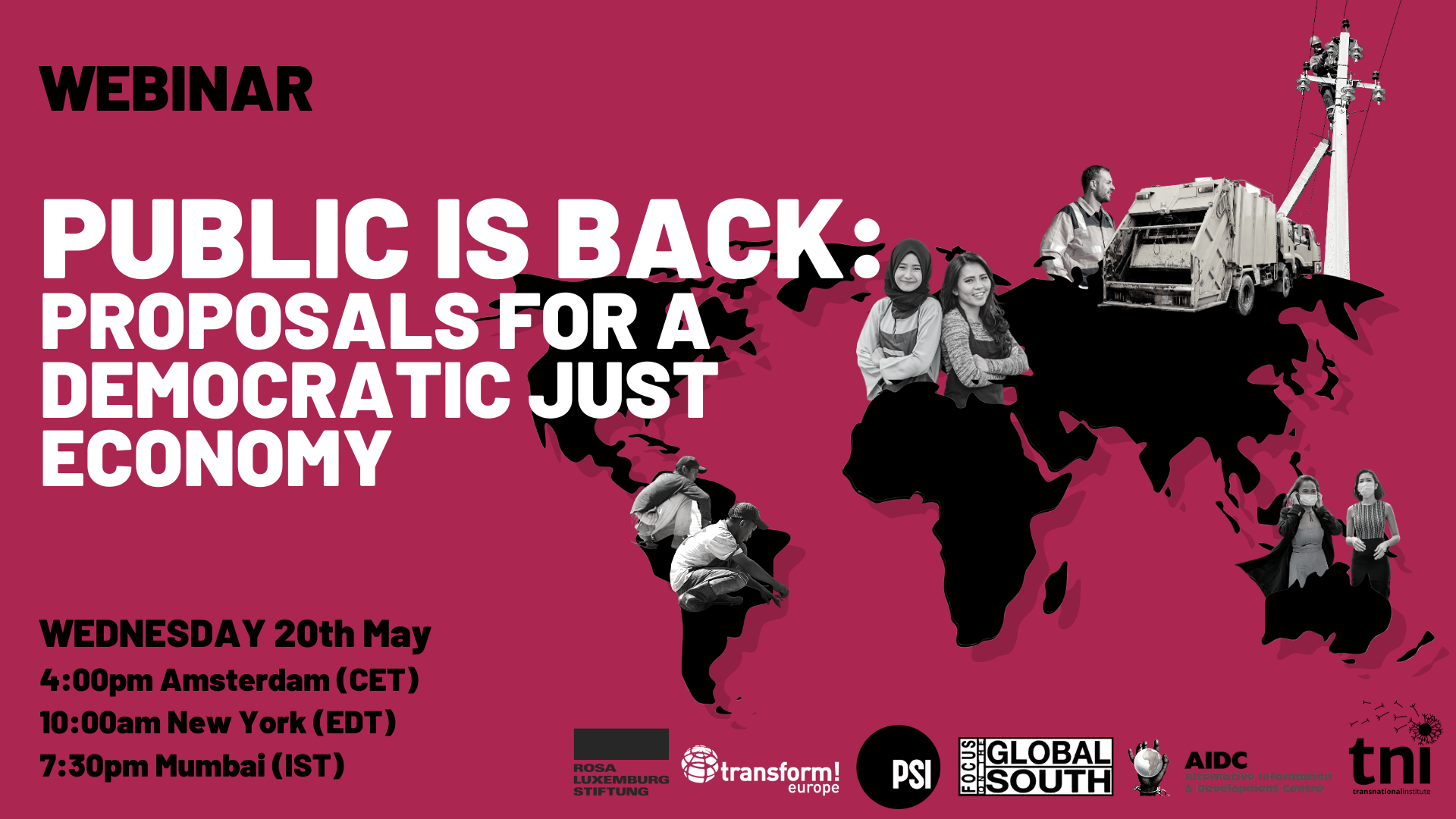|
|
|
Join us tomorrow (20 May) for our seventh Wednesday webinar - Public is back: Proposals for a democratic just economy
Dear reader,
The Covid-19 crisis has made clear the disastrous effects of years of austerity, social security cuts, and public service privatisation. However, it has also demonstrated that public services and the people who operate them are truly the foundation of healthy and resilient societies. As privatisation fails, a growing international movement is choosing (re)municipalisation as a key tool for redefining public ownership for the 21st century.
|

|
Join us tomorrow (20 May) for our seventh Wednesday webinar Public is back: Proposals for a democratic just economy, at 4pm CET. You can register here.
Panellists:
-
Rosa Pavanelli
, General Secretary of the global union federation Public Services International (PSI)
-
Philip Alston
, outgoing UN Special Rapporteur on extreme poverty and human rights
-
Aderonke Ige
, Our Water, Our Rights Campaign in Lagos / Environmental Rights Action /Friends of The Earth Nigeria
-
Sulakshana Nandi
, Co-chair, People's Health Movement Global (PHM Global)
|
|
|
|
|
|
|
|
|
Resistance to privatisation has turned into a powerful force for change. (Re)municipalisation refers to the reclaiming of public ownership of services as well as the creation of new public services. In recent years, our research has identified more than 1,400 successful (re)municipalisation cases involving more than 2,400 cities in 58 countries around the world.
Together, civil society organisations, trade unions, and local authorities are crafting new templates for how to expand democratic public ownership to all levels of society, and opening up new routes to community-led and climate conscious public services.
Read more.
|
|
|
|
|
|
|
|
|
|
|
The Covid-19 pandemic has provoked widespread discussion of what kind of future the world should look forward to after the crisis. One of the areas of economic life around which there is spirited debate is the global food system. This paper focuses on how the pandemic has exposed the fragility of the corporate-dominated global food supply system and shown that it is not, as the Food and Agriculture Organization and its allied agencies see it, part of the solution.
Read more.
|
|
|
|
|
|
|
|
|
|
|
The Energy Charter Treaty (ECT) has been exposed as the fossil fuel industry's powerful secret weapon to keep cooking the planet. It is now on the brink of a massive geographical expansion into Africa, Asia and Latin America, threatening to bind yet more countries to corporate-friendly energy policies. This briefing unpacks the risks for developing countries and the empty promises of those pushing for new countries to join.
Read more.
|
|
|
|
|
|
|
In times of a global healthcare crisis, Transformative Cities is searching for initiatives that show how access to basic rights like water, energy, food and housing can be guaranteed. Are you the collective they are looking for? Join the Open Call!
|
|
|
|
|
|
We are marking the 1000th ISDS claim in the middle of a profound social and economic crisis. Just as the pandemic is revealing deep health inequities and the dangers of agroindustrial food systems, it is also showing the dangers of trade and investment systems that put corporate profits above health and life. Find out more.
As governments take action to fight the COVID-19 pandemic and prevent economic collapse, big law firms are watching the virus too. Yet their concern is not to save lives or the economy. Instead the lawyers urge big business to challenge emergency measures in order to defend their profits. In a parallel corporate justice system called ISDS, states could face multi-million dollar lawsuits. Read more.
There are three ways of looking at COVID-19 and three time frames for responding to the crisis it has created, argues Quinn Slobodian in a think-piece generated after one of TNI's webinars.
The impact of the COVID-19 outbreak on the global economy is unprecedented. Whereas much of the attention is currently focused on the US, Europe and China, there are increasingly serious worries about the consequences for Latin America and Africa. The poor and vulnerable, mainly concentrated in the Global South and dependent on the huge informal sector, suffer the worst from crises. The Corona-crisis will not be an exception; unless swift, coordinated and unorthodox measures are taken.
|
|
|
|
|
|
|
|
|
|
|
|
In this new episode of the State of Power Podcast we take a close look at how lawyers are preparing to sue states over COVID-19 measures.
Subscribe to State of Power on Spotify, TuneIn or AudioBoom
|
|
|
|
|
|
|
|
|
| |
|
|
|
"If only we had the resources of those we are up against, we could change the world!" - TNI President Susan George
Every amount will make an impact towards the Transnational Institute. You can choose to make a once off gift or ongoing donation of support.
|
|
|
|
|
|
| | | |